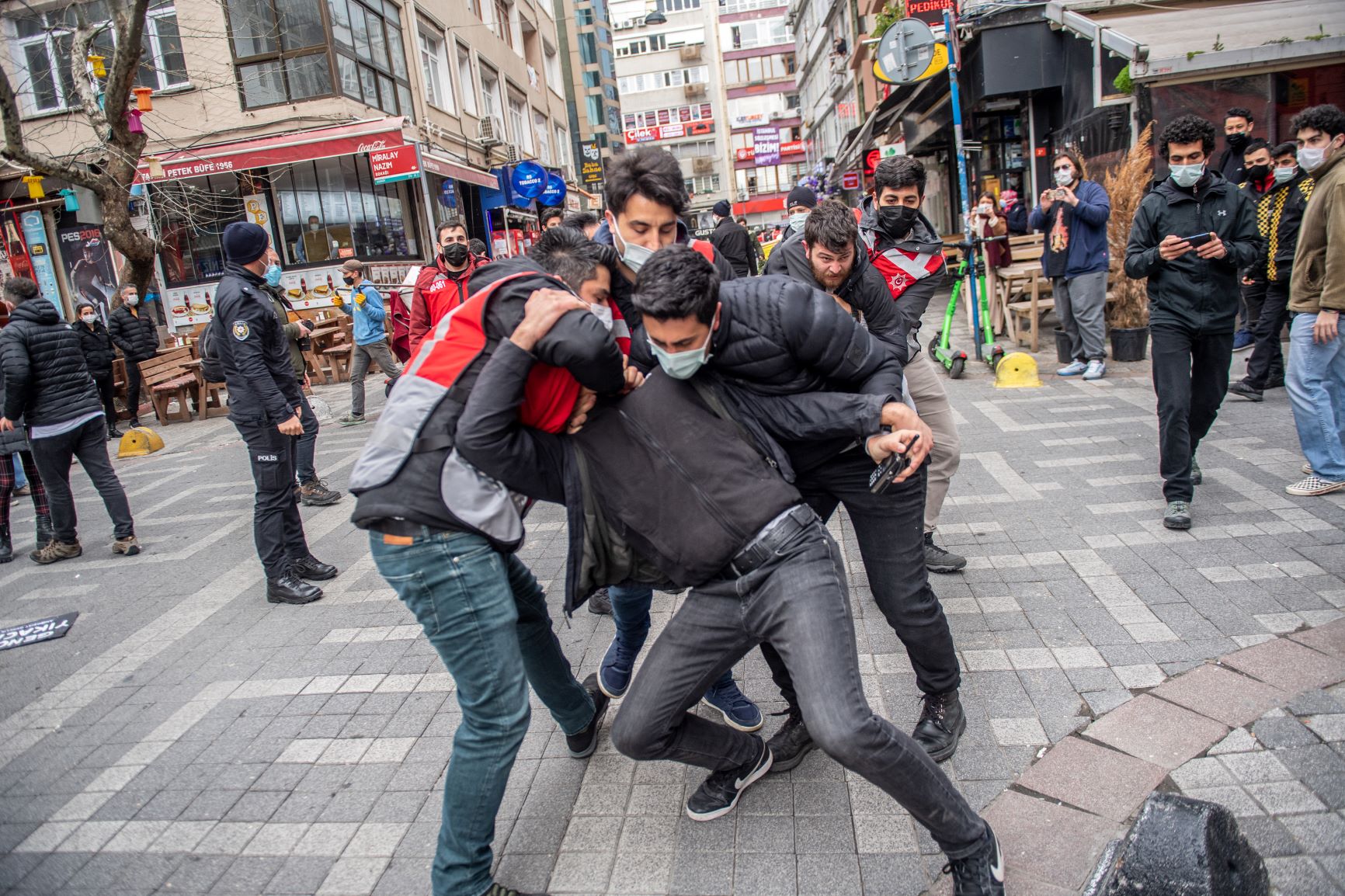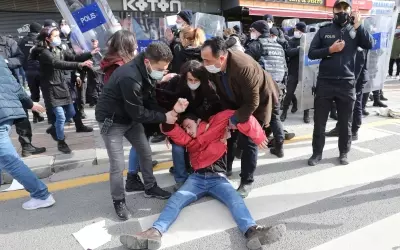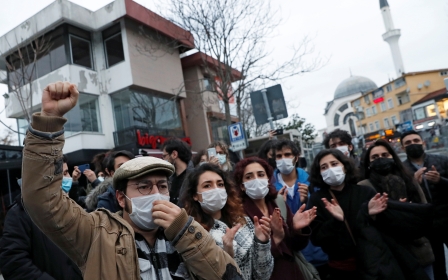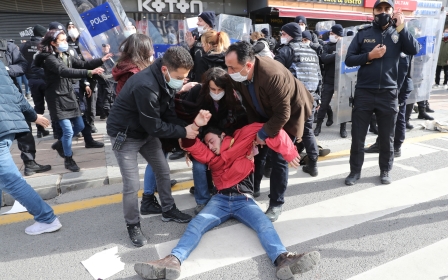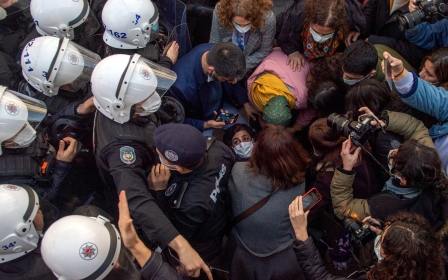Turkey: Bogazici University's fight continues despite rector's dismissal
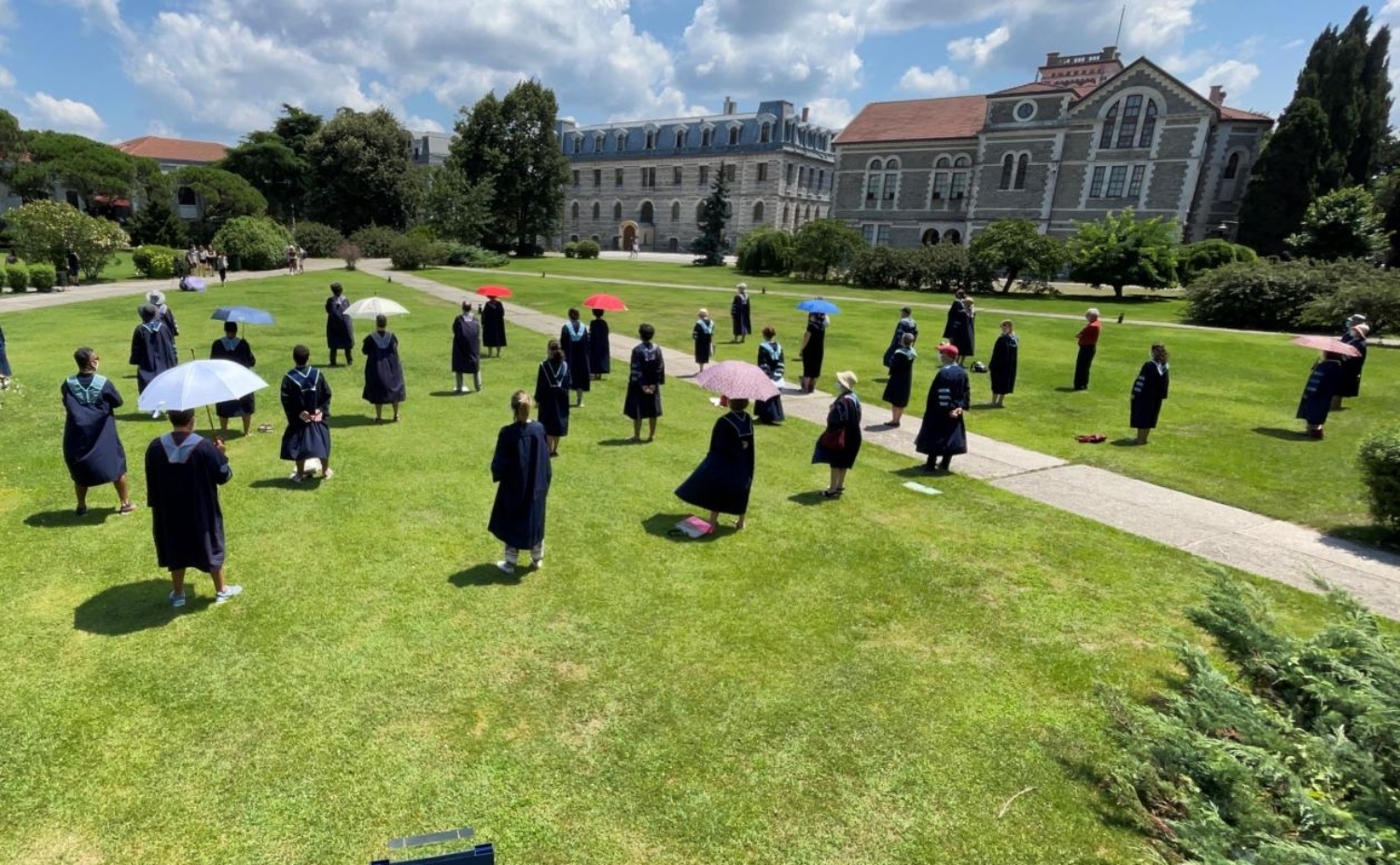
Ece Erten had been planning to attend university in Paris in September. But in February, they were arrested while taking part in demonstrations against the government-appointed rector for the young student's alma mater, Istanbul's Bogazici University - upending their plans.
"I was a Bogazici student who was protesting for my rights at the time - and now I am a Bogazici graduate who is protesting for their rights," they told Middle East Eye.
Erten, who identifies as non-binary, is just one of many students and academics whose lives were turned upside down since January, when demonstrations first erupted over the appointment of Melih Bulu by Turkey's government, a move that overrode a decades-old practice of the rector being elected by faculty.
Now, Bulu is gone. In a surprise move, President Recep Tayyip Erdogan sacked the controversial rector on Thursday, after less than six months on the job.
New MEE newsletter: Jerusalem Dispatch
Sign up to get the latest insights and analysis on Israel-Palestine, alongside Turkey Unpacked and other MEE newsletters
The move has been heralded as a victory by the activists, students and academics who have been unceasing in their campaign to remove Bulu - enduring tear gas, arrests and beatings in the process.
But few believe that his removal means the fight is over, nor that it signals Ankara will restore the university's much-vaunted independence.
"I don’t think they will allow academicians to vote for the new rector," said Erten, while acknowledging that Bulu's removal proved the effectiveness of their protest.
An elected rector
The Bozagici Resistance, a collective of students involved in organising the protests, told MEE on Thursday that Bulu's removal was just the beginning.
"Our resistance will not end until all of our demands are fulfilled," the group said in a statement.
"[Erdogan's] decision to remove Melih Bulu does not mark our victory, as well as it does not mark the end of our resistance."
The collective said the primary goal now was to return to having the faculty vote for the rector.
'We will continue until all of the universities, all of the communities that are harmed by the government are united and free'
- Bogazici Resistance collective
Bogazici University had informally held internal elections to select candidates for rector since 1992, but in 2016 - in the wake of a July coup attempt - the government used a state of emergency to change the process, giving the power to the Turkish president.
"We will continue until all of the universities, all of the communities that are harmed by the government are united and free. What we want now is to elect our rector," said Bogazici Resistance.
On Thursday, activists began spreading the hashtag "Bogazici wants an election" on social media, as they geared up for the next step of their campaign.
A faculty member at Bogazici, who requested not to be named, suggested that the government had become weary of the battle over the university.
"One reading is that they fired him because he failed to take control," the source told MEE, referring to Bulu's inability to reign in hostile university departments and win approval at faculty meetings.
"On the other hand, perhaps they just decided that this wasn't a fight worth fighting? Why destroy Turkey's top university?"
'Freedom of universities'
Erten still recalls when they were arrested in February, at the height of the Bogazici protests.
"The night I was taken into custody, I was imprisoned on my own campus with hundreds of other students," they told MEE.
Erten was taken into detention along with their girlfriend and other students, where they were left without adequate toilet access and no food for hours. Erten's partner, who is a trans woman, was meanwhile isolated from other students.
"They kept her in a ward by herself. The process until I heard from her was very worrying for me. The cops broke her little finger when they took her to the detention bus," Erten explained.
The impact of the ongoing controversy on the lives of student and staff is still being felt months later.
As a result of a travel ban imposed upon them following the arrest, Erten is now unable to go to Paris to continue their studies - though they are now challenging the ruling with a lawyer.
Meanwhile, seven students appeared in court on 6 July for the second hearing of a trial over a piece of artwork, which combined an image of the Kaaba in Mecca, Islam's holiest site, with iconography from the LGBT movement and Turkish folklore.
The students face one to three years in prison on the charge of "publicly provoking the public to hatred and hostility".
Lawyer Levent Piskin said that the charges against his clients needed to be dropped in the wake of Bulu's dismissal.
"All charges must be dropped immediately since they have been using their human rights that are recognised in the constitution," he told MEE. "Their resistance is about the freedom of universities."
For almost 200 days, faculty members have gathered outside the rector's office with their backs turned, a symbolic gesture of defiance and disapproval.
On Thursday, day 193 of the protest, they again gathered outside the office. This time, they applauded.
Translation: 15 July 2021, Bogazici University: Today is the 193rd day of resistance. After Melih Bulu's dismissal, Bogazici University academics came together enthusiastically on campus, despite the fact that today is a public holiday. #WeDoNotAcceptWeDoNotGiveUp
Can Candan, a documentary filmmaker and faculty member at Bogazici, has been one of the most prominent voices among academics opposed to Bulu's appointment.
"For the last six-and-a-half months we have been getting a lot of support from all our stakeholders (faculty, students, staff and alumni) as well as the public," he told MEE.
Maintaining the vigil and other protests for such a long time took its toll, particularly for lecturers who were supposed to be teaching as well.
"Besides all the time and effort we have been putting into these, there is the emotional impact of this assault," said Candan.
"It is actually quite traumatic to experience that the very institution you have been fostering is under attack, that all of us have to endure psychological, procedural and sometimes, in the case of our students, physical violence."
Resistance continues
Bulu's vice rector, Mehmet Naci Inci, has been appointed by the Council of Higher Education as interim rector until a new appointment can be made.
The timing of Bulu's sacking - on the fifth anniversary of the 2016 coup attempt - has been a reminder for some of how centralised power has become in Turkey in recent years.
But with Bulu's appointment, some believe the government overplayed its hand.
"Bogazici is a state university open to all - and many parents, including AKP (ruling party) supporters, dream of sending their children here," the anonymous faculty member said, adding that he suspected the government might now look to appoint someone who was "both acceptable to Erdogan and acceptable to the faculty" in order to cool down the controversy.
Polls have suggested there is widespread opposition to "political" appointees for university rectorships, including from AKP supporters.
The Council of Higher Education has announced that applications would be open for rector candidates until 2 August.
But supporters of the Bogazici Resistance have already made clear that they would reject anything less than a return to faculty elections for the rector and the re-establishiment of the university's independence.
"I stand for my own freedom. I want to be able to live a normal life like any other citizen," said Erten.
"I want to feel safe in my country, like everyone else. It was the liberating values of Bogazici which made me dream of coming here when I was in high school - I don't want to lose these values."
Middle East Eye delivers independent and unrivalled coverage and analysis of the Middle East, North Africa and beyond. To learn more about republishing this content and the associated fees, please fill out this form. More about MEE can be found here.


